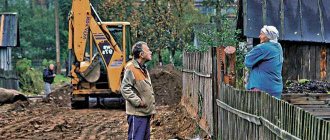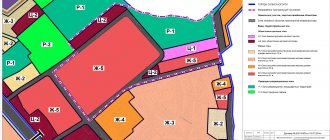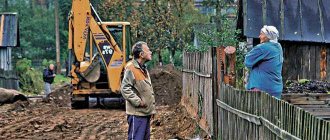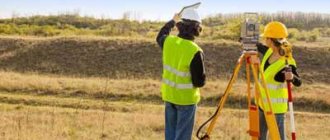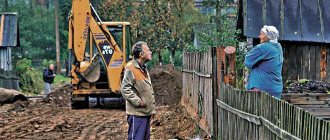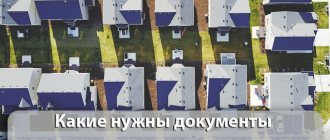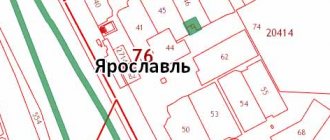An abandoned plot does not mean that it has no owner. Perhaps there is an owner, but for some reason he does not use the land. If an outsider begins to use a plot that has an owner, namely: erect buildings, carry out agricultural work, this will be considered unauthorized seizure. Administrative liability is imposed for such actions. Read the article about how to legalize unauthorized occupied land.
Land in our country is immovable property and for this reason it is possible to become the legal owner of a land plot only after registration of ownership rights. This is set out in the Land Code of the Russian Federation. In this regard, until the ownership of the land is properly registered, and the boundaries of the site are not determined, all manipulations with the land are illegal.
In other words: squatting is the use of someone else's land plot for one's own purposes, without having the legal right to do so. Such actions include: erection of buildings, cultivation of land for agricultural purposes. In this case, the use of the site occurs exclusively for personal purposes, and the seizure of the territory is on one’s own initiative.
Don’t think that only ordinary citizens engage in squatting by placing a vegetable garden in an abandoned neighboring dacha. In most cases, the law is violated by officials who have information about land plots. Having information about plots that are not in demand by the owners, land is seized.
If you encounter something like this, when an unknown person uses your land for personal purposes without having the right to do so, contact law enforcement agencies and the offender will be held accountable.
You can use land for personal needs in our country if one of several factors is present:
- property rights;
- lease agreement;
- easement;
- inheritance rights.
If the person using the land plot does not have any of the above documents, it can be assumed that he has appropriated the plot and is a violator of the law. These persons do not have the right to perform any actions with the land plot, namely: sell; rent out to third parties; make a will; alienate rights in other ways. If the person who has committed the seizure of someone else's territory is engaged in commercial activities on this land, the funds derived from this activity will be considered illegal income.
Fines
Illegal land users are subject to administrative liability - fines. The amount of the fine depends on whether the plot is registered in the cadastral register and whether the cadastral value of this land plot has been determined.
If there is one, then according to Article 7.1 of the Code of Administrative Offenses of the Russian Federation, the amount of fines will be:
- for civilians - 1-1.5% of the cadastral value, but not less than 5 thousand rubles;
- officials - 1-1.5% of the cadastral valuation, but not less than 20 thousand rubles;
- legal entities - 2–3%; the minimum fine is not less than 100 thousand rubles.
In cases where the cadastral value is not determined, the fines will be:
- for civilians from 5 to 10 thousand rubles;
- officials from 20 to 50 thousand rubles;
- for legal entities from 100 to 200 thousand rubles.
But the law is not intended only to punish for the use of someone else’s land; in some cases, squatting can be legalized. To do this you need to do the following:
- Find the copyright holder of the site.
- Carry out the land surveying procedure and establish the boundaries of the land plot in a new manner; obtain a cadastral passport.
- Based on the collected package of documents, register ownership.
It is not difficult to identify the owner of the land; to do this, you need to make a request to Rosreestr or to the architectural/land department of self-government bodies. These organizations are required to provide an official response, which will collect the necessary information about the copyright holder of the site.
What can be considered unauthorized occupation of a plot of land? Unauthorized occupation of land plots refers to certain actions of persons indicating and confirming the actual use of a specific land plot, when there is no decision of the executive authority or local administration that this plot has been transferred into ownership, lease, use, or lifelong inheritable possession.
This offense constitutes an encroachment on the land regulations established by law. Consequently, any arbitrary seizure of a plot of land by any person - individual or legal - is a direct violation of land regulations, which causes damage to the economy, harm to land users, owners, owners. In the event that a plot is arbitrarily seized from state lands or reserve lands, then harm is caused to the state. An unauthorized occupied plot is subject to mandatory return without any compensation to the person who committed the squatting, the costs of developing the land plot. For committing this offense, administrative and property liability arises (Article 7.1 of the Code of the Russian Federation). For unauthorized occupation or use of a plot without the presence of title documents for this land plot, and, if necessary, in the absence of documents allowing the execution of economic activities, administrative fines are established for civil, legal entities and officials. When unauthorized occupation of a land plot, a person (individual or legal) uses a certain plot of land against the will of the owner, without legal grounds for this. But if the law does not require the execution of title documents for the use of any plot of land, then the use of this land plot in the absence of documents will not create an offense. Unauthorized seizure of a land plot includes illegal development of a given land plot, and permanent or temporary storage is also included here. Persons who occupy empty plots without permission should be aware that, according to Art. 16 of the Land Code of the Russian Federation, those plots of land that are not owned by municipalities, legal entities or civilians are the property of the state. In other words, any land plot has its own owner, who can be a civil or legal entity, a municipality, a subject of the Russian Federation or the state. In addition, unauthorized occupation of a land plot is the actions of the owner or tenant, which are aimed at expanding the boundaries of their plot by unreasonably, arbitrarily removing the fence of their own plot beyond its legal boundaries and placing various buildings, as well as storing something outside the provided plot. Neither an individual nor a legal entity that has carried out unauthorized construction can register ownership of it; therefore, this person has no right to make orders regarding such buildings, that is, it will not be possible to sell, donate, lease or make other transactions. It is mandatory to have registered documents when using a land plot. In accordance with paragraph 1 of Art. 60 of the Land Code, a person who has seized a land plot is obliged to restore the rights he has violated. In Art. 76 of the Land Code of the Russian Federation states that all unauthorized occupied plots of land must be returned to their legal owners, tenants, landowners, land users without compensation for costs incurred by persons guilty of violating land legislation during the period of illegal use of these land plots. This includes the demolition of erected buildings and structures, as well as the restoration of land plots to a suitable condition. The land plot must be used in the presence of executed documents in the manner prescribed by law. In the Civil Code of the Russian Federation, Art. 131 states that rights to real estate, as well as various types of transactions and restrictions, must undergo mandatory state registration. Therefore, having in hand a decree on the provision of ownership of a land plot, a lease agreement or any other document, it is imperative to visit the Rosreestr authorities and register the right to the provided land plot. That is, title documents, regardless of their type, must be registered in the prescribed manner.2 In the event that a land plot is alienated (sale, donation), then a proper alienation agreement for this land plot must be submitted by both parties to the agreement to Rosreestr for registration of the transfer to the new owner of property rights. If the transaction is concluded orally or in writing without state registration, which will secure the transfer of rights, the previous owner (donor, seller) remains the full owner of the land plot that has not undergone re-registration. The actions of the donee or buyer who will use the land plot without mandatory registration of the right are classified according to Art. 7.1 of the Code of Administrative Offences. An exception will be contracts for gratuitous fixed-term use, lease and sublease agreements, which are concluded for a period of up to one year (Clause 2 of Article 26 of the Land Code of the Russian Federation). The use of a land plot without the presence of documents drawn up in accordance with the procedure established by law that allow the execution of economic activities is covered by a number of norms of the legislation of the Russian Federation. This includes construction without obtaining proper permission from the executive authority responsible for construction and architecture issues, small retail trade, as well as land work, which requires approval from the State Architectural and Construction Supervision, etc. Registration of the “seizure” of a land plot if you have an old-style registration certificate1 • Determine the boundaries of the land plot (the work is performed by a surveyor). • Apply to the local administration. • If the newly determined dimensions do not coincide with the dimensions indicated in the original documents (according to the new measurements, the area of the plot is larger), then you will have to go to court to legalize the boundaries. • State registration of rights to a land plot
Four scenarios
- If the plot belongs to local government or SNT, you must provide an application for the allocation of this land plot for personal use to the applicant.
- In the case where the plot belongs to the state, you will need to take part in the auction and, accordingly, emerge as the winner. The auction provides the potential to increase land area and formalize the squatting of public areas quickly and inexpensively. The cost per square meter in this case will be 15% of the cadastral valuation.
- Perhaps the land already has an owner and in this situation there is only one way out - to enter into negotiations and insist on the alienation of property rights. In simple words - persuade them to sell and do it as cheaply as possible.
- Another option is that the land is ownerless, which means it has no owner. Then you need to contact local authorities with an application for registering the land with cadastral registration. But this procedure is quite long, since after registration in the cadastre the plot will become the property of the municipality in a year. And only after a year can you become a contender for the right to use the land.
What to do if boundary boundaries are violated with a plot belonging to a neighbor?
The land grab situation is quite popular. The land plots are located in the neighborhood, and there is a fence on the border of the territory. To privatize a plot, land surveying is carried out and a cadastral plan is drawn up. When carrying out a survey, a cadastral engineer identifies a violation of boundaries.
In theory, fixing the situation is simple. It is enough to move the fence to the boundary indicated by the engineer. In practice, disputes over property boundaries are one of the most popular conflicts between neighbors.
If a neighbor refuses to move the fence voluntarily, then you must act as follows:
- Prepare documents.
- Send a complaint to your neighbor.
- Go to court (if the neighbor refuses to comply with the requirement specified in the complaint).
Let's take a closer look at the procedure.
Land Code on the restoration of land rights
According to Articles 60, 76 of the Land Code, unauthorized occupied land plots are returned to their owners, and the violated right to a land plot is subject to restoration.
Restricting access to land and erecting buildings without permitting documents is punishable by law.
In practice, it often happens that citizens use land for many years without title documents, and many of them do not even think that this land can be withdrawn from circulation by declaring squatting. To avoid troubles, the right to a land plot should be legalized. How to register land squatting according to the 2021 law and where should I go for this?
Going to court if a neighbor has occupied part of the plot
If there are cases of claims to your land from neighbors, first take measures to peacefully resolve the dispute. If you did not use such measures, this will deprive you of the possibility of further recourse to court. To have confirmation of compliance with the peaceful settlement of the dispute before the trial, write the claim in writing and hand it over to the violator of the law against signature.
If peace negotiations are unsuccessful, file a claim in court for violation of the boundaries of your land plot, attaching the following documents to it:
- documents confirming your right to own the disputed plot of land. This can be any agreement on the alienation of a land plot or a document on the right to inheritance;
- cadastral plan of the site;
- evidence of encroachment on your land plot. A specialist can help with this, who will check the condition of the boundaries of the land plot and determine whether there have been violations of its boundaries;
- receipt of payment of state duty.
A lawyer who specializes in land law will help you achieve a positive result in such a difficult matter. Understanding all the intricacies of land legislation, he will help you choose the right legal position and protect your interests.
Land Use Basics
The principles and basic norms for the use of land plots are defined. Their main postulates are listed in Art. 1:
- the importance of land as the main component of life;
- the priority of its protection as an essential element of the environment and a means of production;
- the primacy of protecting human life and health;
- uniformity of fate of sites and related objects;
- payment for use;
- the right to participation of public and religious organizations, as well as individual citizens in resolving issues related to the implementation of their rights to land;
- the primacy of the conservation of especially valuable lands and protected areas;
- division into categories according to intended purpose;
- equal respect for the legitimate interests of citizens and society.
Read more about the principles on which land use in the Russian Federation is based.
The concept of land squatting
Land is real estate, so you can use and own it after ownership is registered. This is stated in the Land Code. Therefore, until the exact boundaries of the plot are determined, until the right is registered and documents about this are not in the hands of the owner, any actions with the plot are considered illegal.
That is, independent seizure of land is the appropriation of a plot and its use by a person who does not have the right to it. Use occurs to satisfy personal goals, and occupation occurs on one’s own initiative.
This does not mean that ordinary citizens can break the law. As a rule, violators are officials who have access to information about certain plots of land. As soon as it is determined that someone is using the land illegally, this must be recorded in documents. Based on them, the violator will be held accountable. Where to complain when land is squatted? To law enforcement agencies.
Where to complain if your neighbors seize your land
There is also another form of statement in case of squatting - a statement from the injured party. Where then should you go to restore your legal rights to the land?
The first thing you should do is contact your neighbor. If you believe that the land that he seized rightfully belongs to you, then you need to justify this and document it. Unfortunately, it is not always possible to reach an amicable agreement with neighbors and then you have to complain.
To begin with, you can write an application to the local administration, but this does not always bring results. In any case, attempts at pre-trial settlement of land disputes will only be a plus for the applicant.
Judicial regulation remains. The court resolves all land disputes taking into account the law, established practice and based on documentary evidence.
How to legitimize squatting
If the territory was occupied without the consent of the authorities, the question arises of how to legalize the squatting of the land. This is possible, but there are some limitations to consider.
The rules for the redemption of an allotment are established by Art. 39.18 Land Code of the Russian Federation. However, certain categories of land in respect of which illegal appropriation has been committed cannot be legalized. These include:
- territories that open into the forest zone;
- areas beyond the “red lines”, which fence off power lines, gas pipelines, and communication elements.
In addition, it will be possible to legitimize only areas that are not claimed by legal entities, private individuals or partnerships. In this case, you can either register the land as your property or rent it from the owner.
Corruption of the earth
Violation of sanitary standards during the construction of bathhouses and street toilets, dumping of waste on site, unauthorized excavation of pits, etc.
- all this will be considered damage to the top fertile layer of the earth. For these actions, in accordance with Article 8.6 of the Code of Administrative Offenses, citizens are subject to a fine of 3,000 to 5,000 rubles. In addition, an order will be issued to eliminate violations and reclaim the land. For ignoring it, according to Article 8.7 of the Code of Administrative Offenses, a citizen faces a fine of 20,000 to 50,000 rubles.
As you can see, there are many restrictions that any land owner must comply with if he does not want problems with the law.
What do you think, which of these restrictions are really necessary and which are useless?
Which ones would you personally remove and which ones would you add? Please share your opinion in the comments. If you liked the article, please share it on social networks. HAVE TIME BEFORE NG!
The most visited Clerk course on management accounting is already taken by more than 100 of your colleagues. Hurry up to sign up for the course at the old 2021 price. Then it’s more expensive. Pay now, study in 2022 in a convenient stream.
- Duration 120 hours in 1 month
- Your ID in the Rosobrnadzor register (FIS FRDO)
- We issue a certificate of advanced training
- The course complies with the professional standard “Accountant”
View full program
Land protection
The definition of legal protection of land resources includes a system of measures enshrined in legislation that are aimed at ensuring the rational exploitation of lands, preserving and increasing their fertility, and protecting them from destruction and depletion.
These measures are applied comprehensively and are carried out with the aim of:
- preventing land degradation/destruction and other negative consequences of management by stimulating environmentally friendly production technologies;
- ensuring the restoration and improvement of agricultural areas that have been disturbed or degraded;
- creating rules for checking and accounting for the environmental status of resources.
The legislation provides for preventive and restoration measures and legal liability for violation of land legal standards.
Find out in more detail what legal land protection is and how it is carried out.
Grounds for refusal of state registration
Submitting documents for registration of a right does not mean that it will necessarily be registered. The applicant may be refused, in some cases. The reasons for this are as follows:
- documents are not prepared in accordance with current legislation;
- this land plot is the subject of legal proceedings regarding the establishment of legal boundaries;
- the register does not contain updated information about the boundaries of this land plot;
- there is a conflict between the already registered right and the one they are trying to register now;
- the completed documents do not contain all information about the applicant or the site, or the information provided is not true.
In order to register ownership of a plot of land that fits the category of squatting, you must contact a qualified specialist in St. Petersburg for legal services. Do not delay in submitting documents, as illegal use may lead to penalties.
Unregistered buildings
Agree, not everyone would think of registering a gazebo or enclosure for a dog.
But, often, these and many other structures on the site, from the point of view of the law, are real estate objects that must be registered with Rosreestr, and for which taxes must be paid. Many people have buildings on their plots that were erected many years ago, from what was there, and have not been used for their intended purpose for a long time. So, standing in the far corner of the site, on an improvised foundation, a pile of nails and sticks must also be registered with Rosreestr and taxed. Otherwise you will have to pay fines.
How is land illegally acquired?
Citizens can appropriate other people's land plots in different ways. The objects of their encroachments are both private territories and public agricultural lands. For example, one of the neighbors carries out an unauthorized construction and seizes public land. By building structures on it for personal purposes, the violator is narrowing the passage to the plots of other landowners and trampling on their right to unhindered access of vehicles to the house.
Landowners whose rights have been violated report the invaders' actions to local authorities, who respond accordingly.
Unauthorized appropriation of lands owned by other citizens occurs much less frequently than squatting of public land, since such cases are established very quickly and can be challenged in court.

